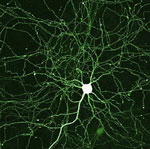 Researchers at Mount Sinai School of Medicine have published new data on why the aging brain is less resilient and less capable of learning from life experiences. The findings provide further insight into the cognitive decline associated with aging and neurodegenerative diseases like Alzheimer’s. The study is published in the May 25 issue of the Journal of Neuroscience.
Researchers at Mount Sinai School of Medicine have published new data on why the aging brain is less resilient and less capable of learning from life experiences. The findings provide further insight into the cognitive decline associated with aging and neurodegenerative diseases like Alzheimer’s. The study is published in the May 25 issue of the Journal of Neuroscience.
The Mount Sinai team evaluated the prefrontal cortex — the part of the brain that controls a wide range of cognitive processes and mediates the highest levels of learning. Nerve cell circuitry in the prefrontal cortex of young animals is highly plastic, and life experiences, particularly those that involve learning, can profoundly alter prefrontal circuitry.
For example, stress causes nerve cells to shrink and lose synapses — the sites of communication between nerve cells in this brain area of young animals — and the nerve cells recover once the stress ends. In order to investigate the effects of age on such plasticity, young, middle-aged, and aged rats were subjected to a behavioral stress test known to elicit nerve cell changes in the prefrontal cortex.
The research team then used microscopic techniques to visualize the spines on nerve cells within the prefrontal cortex. Spines are specializations on nerve cells that form the synapses that are critically important to the process of learning. In the young rats, the spines were able to adjust and change, indicating that the brain responded to the experience and initiated a compensatory change. In the middle-aged rats, and even more so in the aged rats, the spines did not change, demonstrating that age is accompanied by a profound loss in the capacity of prefrontal cortex to “re-wire” in response to life events.
“We suspected that these nerve cells would be altered by age, but the loss of synaptic plasticity in the context of life experience has profound implications for age-related cognitive decline,” said John H. Morrison, PhD, Dean of Basic Sciences and the Graduate School of Biological Sciences and Professor in the Department of Neuroscience at Mount Sinai School of Medicine. “This study identifies precisely the synaptic basis for age-related loss of experience-dependent plasticity, which is likely required for adaptive learning.”
The research team was led by Dr. Morrison and graduate student Erik B. Bloss, who also conducted an earlier study published in the May 12, 2010 edition of the Journal of Neuroscience. That study provided the first evidence linking aging to a loss of resilience: While the nerve cells of young rats were resilient and able to recover from stress, the brains of aged rats demonstrated a profound loss of recovery-related nerve-cell changes.
“The prefrontal cortex is constantly ‘rewiring’ in response to life experiences,” said Dr. Morrison. “The aged brain has already suffered significant spine loss, and the spines that remain are unable to mount a response to stress or learning, making this part of the brain unable to effectively rewire. These findings give us a foundation to research treatment interventions to protect against age-related cognitive decline, which occurs in diseases like Alzheimer’s. Since these changes occurred in middle-aged rats and more substantially in aged rats, the data suggest that early interventions will likely be required to sustain optimal synaptic and cognitive health.”
Dr. Morrison and his team conclude that further research is needed to determine if the decreased spine density is due to a loss of spines or a lack of new spines forming. “Understanding how this process occurs, and which aspects may be amenable to treatment, should be a major goal for future studies aimed at ameliorating changes in nerve cell plasticity and cognition during aging.”
Material adapted from Mount Sinai Medical Center.
No comments yet.